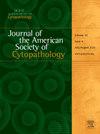Outcome of atypical urothelial cells (AUC) in patients without prior history of urothelial carcinoma
Q2 Medicine
Journal of the American Society of Cytopathology
Pub Date : 2025-09-01
DOI:10.1016/j.jasc.2025.06.001
引用次数: 0
Abstract
Introduction
An “atypical” diagnosis is subjective in any cytologic specimen, and the interpretation is often problematic. To mitigate this issue, The Paris System for Reporting Urinary Cytology was released in 2016. Its goal was to standardize the criteria for urine cytology specimens. Atypical urothelial cells (AUC) can be a difficult diagnosis for clinicians to utilize, as it does not give a definitive answer as to whether a patient has a urothelial malignancy or not. However, a diagnosis of AUC is an acceptable option for a urine specimen that has characteristics that are clearly abnormal but fall short of malignancy.
Materials and methods
Voided urine specimens signed out as AUC in 2019 and 2020 from patients without a history of urothelial carcinoma were identified using the laboratory information system. Patient history, clinical history, and follow-up through April of 2024 were recorded. Selected cases were reviewed microscopically for the AUC diagnosis on the voided urine specimen.
Results
Of 151 cases identified, 50 (33.0%) cases included biopsy follow-up, and one case had follow-up of a ureteral brushing. Of those 51 cases, 33 (64.7%) cases had a positive follow-up, 12 (23.5%) cases had a negative follow-up, and 6 (11.8%) cases had a follow-up that showed a nonurothelial malignancy.
Conclusions
Previous similar studies have evaluated the outcome of AUC diagnoses, but it is common for those patients to have had a prior history of urothelial carcinoma. In this study, the diagnosis of AUC correlates to an eventual diagnosis of malignancy in 63.0% of cases without a known history of urothelial carcinoma. Based upon these results and previous studies, AUC appears to be a beneficial diagnosis for the patient but may lead to variable outcomes in patient follow-up.
非典型性尿路上皮细胞(AUC)在无既往尿路上皮癌患者中的预后。
在任何细胞学标本中,“非典型”诊断都是主观的,其解释往往是有问题的。为了缓解这一问题,2016年发布了《巴黎泌尿细胞学报告系统》。其目的是标准化尿液细胞学标本的标准。非典型尿路上皮细胞(AUC)对于临床医生来说是一个难以利用的诊断,因为它不能给出患者是否患有尿路上皮恶性肿瘤的明确答案。然而,如果尿液标本的特征明显异常,但不属于恶性肿瘤,则诊断AUC是可以接受的。材料与方法:利用实验室信息系统对2019年和2020年无尿路上皮癌病史患者的尿标本进行AUC鉴定。记录患者病史、临床病史及随访至2024年4月。选择的病例在显微镜下进行尿标本的AUC诊断。结果:在151例确诊病例中,50例(33.0%)进行了活检随访,1例进行了输尿管刷尿随访。51例患者中,阳性随访33例(64.7%),阴性随访12例(23.5%),非尿路上皮恶性肿瘤随访6例(11.8%)。结论:先前的类似研究已经评估了AUC诊断的结果,但对于那些有尿路上皮癌病史的患者来说,这是很常见的。在本研究中,在没有已知尿路上皮癌病史的病例中,63.0%的AUC诊断与最终的恶性诊断相关。基于这些结果和先前的研究,AUC似乎对患者是一种有益的诊断,但可能导致患者随访的不同结果。
本文章由计算机程序翻译,如有差异,请以英文原文为准。
求助全文
约1分钟内获得全文
求助全文
来源期刊

Journal of the American Society of Cytopathology
Medicine-Pathology and Forensic Medicine
CiteScore
4.30
自引率
0.00%
发文量
226
审稿时长
40 days
 求助内容:
求助内容: 应助结果提醒方式:
应助结果提醒方式:


